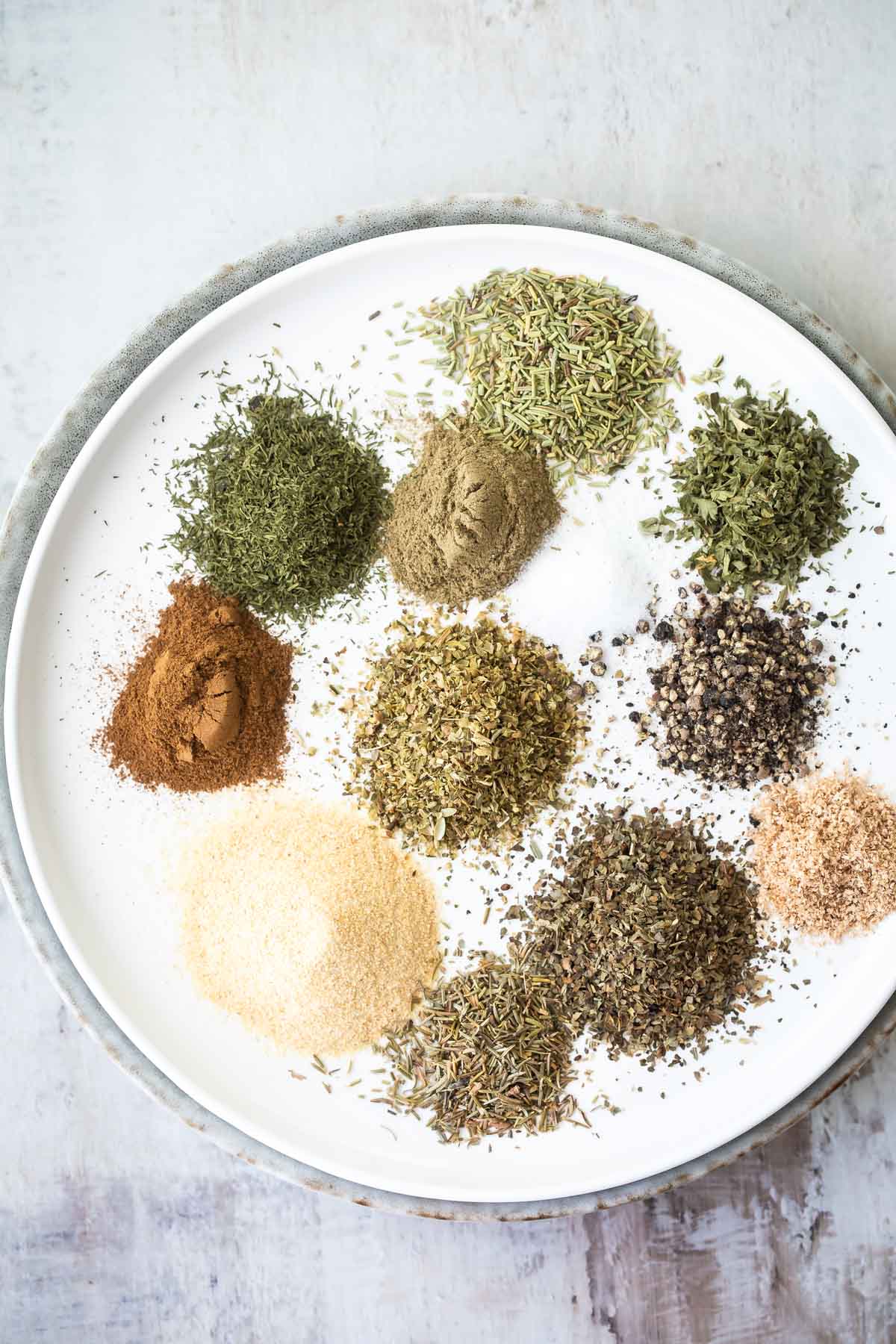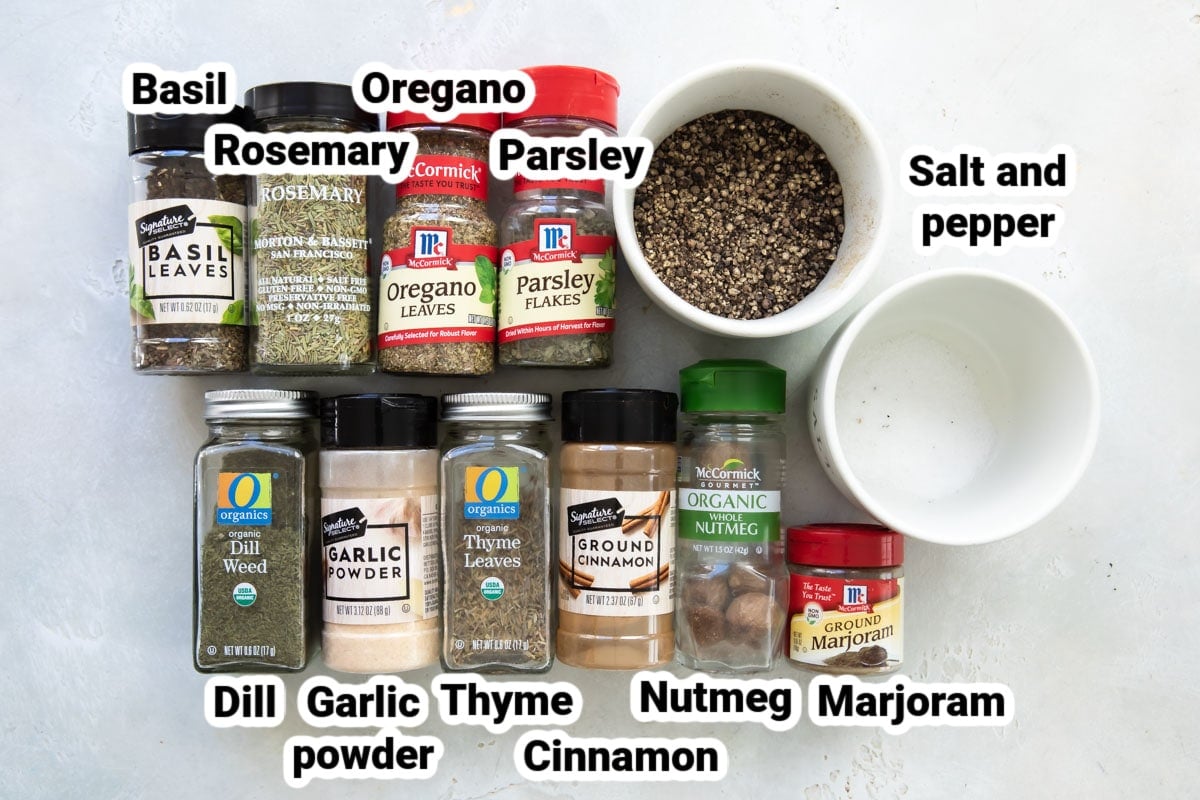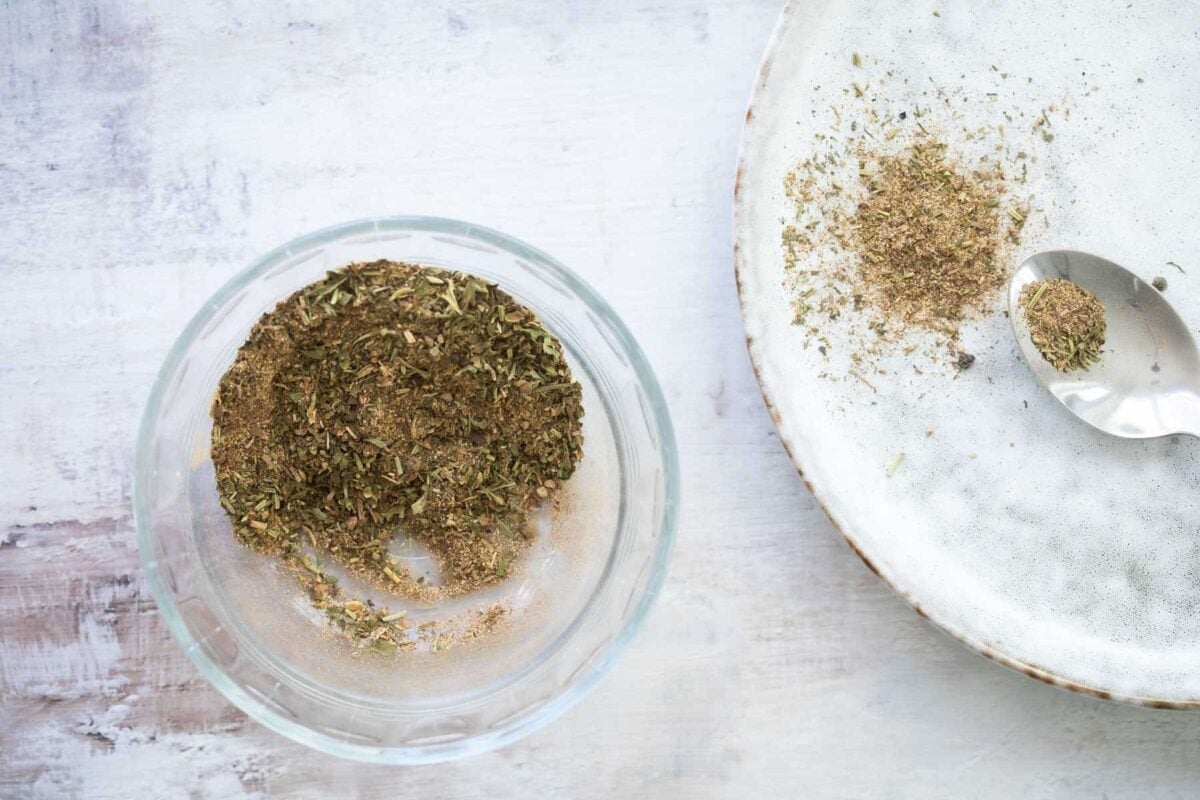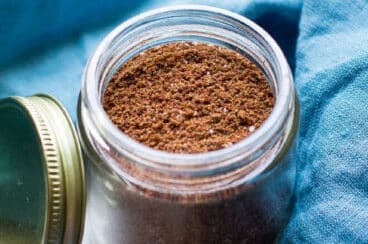This post may contain affiliate links. For more information, please see our affiliate policy.
This homemade Greek Seasoning recipe can be mixed together in minutes and adds authentic Greek flavor to any recipe. Delicious, versatile, and easy, this all-purpose blend can be used on chicken, lamb, beef, vegetables, kebabs, salads, and more.

This easy Greek Seasoning blend is packed with flavors like basil, oregano, dill, marjoram, rosemary, cinnamon, and nutmeg. It’s herbaceous and warming at the same time, a delicious way to add Mediterranean flavor to meats, vegetables, salads, and more.
It’s okay to leave out an ingredient or two if you don’t have them, or add something else that you really love. And consider whether you want to add salt. Personally, I think it’s easier to leave salt OUT of the blend and just add salt to food directly while I’m cooking with it. That way, I can use Greek Seasoning blend with reckless abandon and not worry about over-salting my food.
Table of Contents
Recipe ingredients

At a Glance: Here is a quick snapshot of what ingredients are in this recipe.
Please see the recipe card below for specific quantities.
Ingredient notes
- Greek oregano: A member of the mint family, Greek oregano tends to be the most savory and earthy, compared to the milder Italian oregano or more pungent Turkish oregano. There is also Mexican oregano which has notes of citrus and mild licorice as it is a relative of lemon verbena. You can use your preferred oregano in this blend.
- Salt: Control the salt in your recipes by omitting it from the blend. When you cook with Greek seasoning, you can salt your meat, vegetables, or anything else at that time and use just what you need.
Instructions
- In a small bowl or jar, add basil, garlic powder, Greek oregano, black pepper, cinnamon, dill, marjoram, parsley, rosemary, nutmeg, and thyme. Add salt to taste (I like 1 teaspoon, or omit entirely). Store in a spice jar or other airtight container.

Recipe tips and variations
- Yield: This recipe makes just over 4 tablespoons of Greek seasoning, or about ¼ cup.
- Storage: Store covered in an airtight container in a cool, dark place for up to 6 months (or longer, but potency will decrease after 6 months).
- Ground: If you prefer a finely-ground blend, process in an electric spice grinder.

Recipe FAQs
Greek cuisine primarily uses oregano, mint, garlic, onion, dill, and bay leaf, along with the addition of basil, thyme, fennel seed, and parsley.
There are an abundant amount of Greek herbs since it is a country located in the Mediterranean. The most notable herbs include basil, bay leaf, dill, fennel, marjoram, mint, oregano, parsley, purslane, rosemary, sage, savory, tarragon, and thyme.
Middle Eastern spice blends frequently include allspice, black pepper, cardamom, cinnamon, cloves, coriander, cumin, nutmeg, and dried chiles. As Mediterranean and Middle Eastern cuisine are closely related, we are adding a bit of warmth to our Greek seasoning recipe with the addition of a few of these spices.
If you do not have marjoram, oregano is the best substitute as the two stems from the same herb family and are closely related in flavor. You can also replace marjoram with an equal amount of dried sage, thyme, summer savory, or basil.
Greek oregano, a member of the mint family, tends to be the most savory and earthy, compared to the milder Italian oregano or more pungent Turkish when comparing the Mediterranean varieties. There is also Mexican oregano which has notes of citrus and mild licorice as it is a relative of lemon verbena. But by all means, use the variety of oregano that suits your needs!
More homemade spice blends
Spice Blend Recipes
Homemade Taco Seasoning
Spice Blend Recipes
Cajun Seasoning
Spice Blend Recipes
Montreal Steak Seasoning
Spice Blend Recipes
Fajita Seasoning
Join Us

Greek Seasoning
Ingredients
- 2 teaspoons dried basil
- 2 teaspoons garlic powder
- 2 teaspoons Greek oregano (see note 1)
- 1 teaspoon ground black pepper
- 1 teaspoon ground cinnamon
- 1 teaspoon dried dill weed
- 1 teaspoon dried marjoram
- 1 teaspoon dried parsley
- 1 teaspoon dried rosemary
- 1/2 teaspoon ground nutmeg
- 1/2 teaspoon ground thyme
- Salt (see note 2)
Instructions
- In a small bowl or jar, add basil, garlic powder, Greek oregano, black pepper, cinnamon, dill, marjoram, parsley, rosemary, nutmeg, and thyme. Add salt to taste (I like 1 teaspoon, or omit entirely). Store in an airtight container.
Notes
- Greek oregano: A member of the mint family, Greek oregano tends to be the most savory and earthy, compared to the milder Italian oregano or more pungent Turkish oregano. There is also Mexican oregano which has notes of citrus and mild licorice as it is a relative of lemon verbena. You can use your preferred oregano in this blend.
- Salt: Control the salt in your recipes by omitting it from the blend. When you cook with Greek seasoning, you can salt your meat, vegetables, or anything else at that time and use just what you need.
- Yield: This recipe makes just over 4 tablespoons of Greek seasoning, or about ¼ cup.
- Storage: Store covered in an airtight container in a cool, dark place for up to 6 months (or longer, but potency will decrease after 6 months).
Nutrition
Meggan Hill is a classically-trained chef and professional writer. Her meticulously-tested recipes and detailed tutorials bring confidence and success to home cooks everywhere. Meggan has been featured on NPR, HuffPost, FoxNews, LA Times, and more.




This Greek seasoning is really good. The only thing I would change is the amount of salt. The first time I made it I followed the recipe exactly and found it to be a bit salty for my taste. I would first make this with the salt cut it in half and add the rest if you like more later. I triple this recipe and store it for constant use. I really enjoy the flavors of Greek food.
Hi Judith, thank you for taking the time to comment. I agree, and I’ve updated the recipe so folks can adjust the salt to their taste preference. Thank you! – Meggan
Could I use this spice blend to make greek meatballs? If so, in what sort of quantity should I incorporate it?
Hi Lee, yes you definitely can use this blend for meatballs! I haven’t tested them though, so I don’t know exactly which quantity of seasoning to use off-hand. I can test it before the end of the month and let you know for sure, or you can give it a shot yourself. This is what I would do to test: I would start with a pound of beef and mix in 1 tablespoon of the seasoning. Then I’d break off a small amount and form a 1-inch patty and fry it and see how it tastes. If it’s good, make meatballs! If there is no flavor, add another tablespoon of seasoning (or just more salt, if that’s what it needs) and go from there. That’s what I will do when I test it, but I can’t test them until 9/28. So. If you want to try before then, do that! Otherwise I’ll reply with my findings and let you know. Thank you! -Meggan